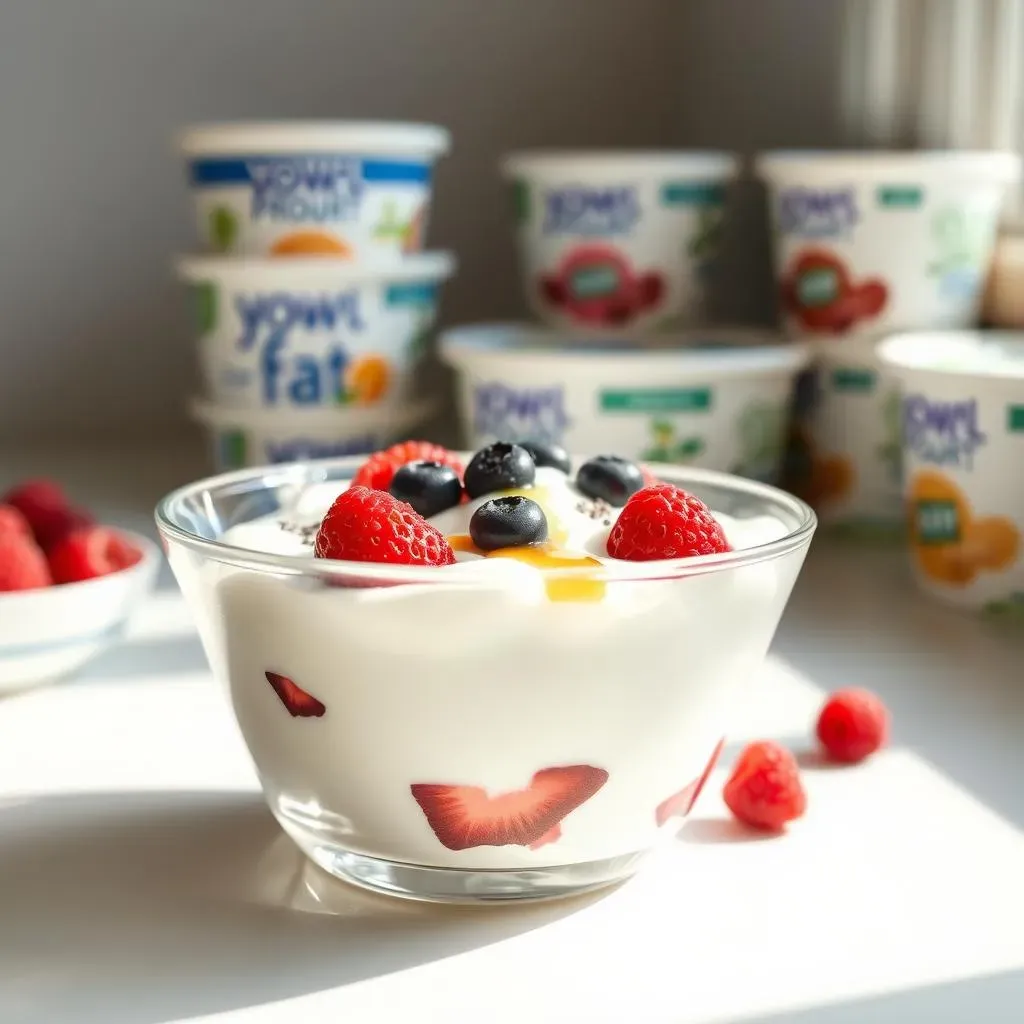Table of Contents
Navigating the yogurt aisle can feel like decoding a secret language. With countless brands and types vying for your attention, how do you choose a truly healthy low fat yogurt? Yogurt boasts a range of benefits, from supporting gut health with probiotics to providing a protein punch that keeps you feeling full. But not all yogurts are created equal. Many are loaded with added sugars and artificial ingredients that can negate their health benefits. This article will be your guide to confidently selecting the best healthy low fat yogurt for your needs. We'll break down what to look for on nutrition labels, explore the different types of yogurt available, and offer delicious and nutritious topping ideas to elevate your yogurt game. Get ready to discover how this versatile snack can become a cornerstone of your healthy eating habits. From understanding the importance of probiotics and protein to navigating the world of dairy-free options, we've got you covered. Let's dive in and unlock the secrets to enjoying healthy low fat yogurt that truly nourishes your body.
The Health Perks of Yogurt: Why It's a Daily MustHave
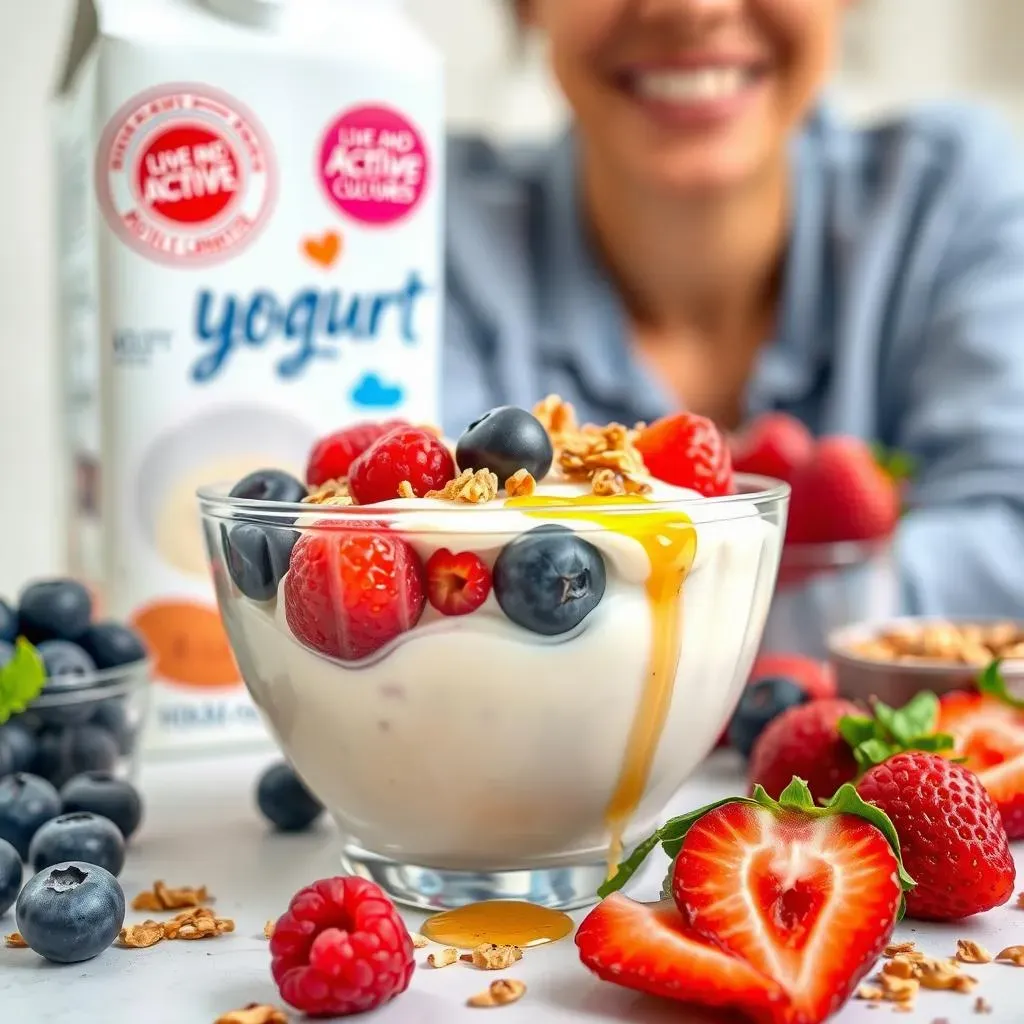
The Health Perks of Yogurt: Why It's a Daily MustHave
Gut Health Champion
Yogurt is a fantastic source of probiotics, those friendly bacteria that reside in your gut. These little guys play a huge role in digestion, nutrient absorption, and even your immune system. Think of your gut as a bustling city, and probiotics are the helpful citizens keeping everything running smoothly. When you've got a good balance of these beneficial bacteria, you're less likely to experience digestive issues like bloating, gas, and constipation. Beyond that, a healthy gut is linked to improved mental health and a stronger defense against illness. So, adding yogurt to your daily routine is like sending reinforcements to your gut's army, helping you stay healthy and happy.
But remember, not all yogurts are probiotic powerhouses. Look for the "Live and Active Cultures" seal from the National Yogurt Association to ensure you're getting a product with a significant amount of these beneficial bacteria. It's like checking for a certification to make sure you're getting the real deal!
Protein Powerhouse
Need a filling snack that keeps you satisfied for hours? Yogurt is your answer. It's packed with protein, which is essential for building and repairing tissues, supporting muscle growth, and keeping hunger at bay. Starting your day with a yogurt parfait or enjoying a cup as an afternoon snack can help you manage your weight and avoid those mid-day energy crashes. Protein also plays a key role in hormone production and enzyme function, making it a vital nutrient for overall health.
Greek yogurt, in particular, stands out for its high protein content. It's strained to remove excess whey, resulting in a thicker, creamier texture and a concentrated dose of protein. Think of it as the protein supercharger of the yogurt world! But remember, even regular yogurt offers a good amount of protein, so choose the type you enjoy most and make it a regular part of your diet.
Essential Nutrients Galore
Beyond probiotics and protein, yogurt is a treasure trove of essential nutrients that your body needs to thrive. It's an excellent source of calcium, which is crucial for strong bones and teeth. It also provides vitamin D, which helps your body absorb calcium and supports immune function. Additionally, yogurt contains potassium, phosphorus, and vitamin B12, all of which play important roles in maintaining optimal health. These nutrients work together to keep your body functioning at its best, from supporting nerve function to producing red blood cells.
Think of yogurt as a multivitamin in a delicious, creamy package. It's a convenient and enjoyable way to ensure you're getting a wide range of essential nutrients that contribute to your overall well-being. So, make yogurt a regular part of your diet and reap the rewards of its nutritional goodness!
Key Nutrients in Yogurt
- Calcium: For strong bones and teeth
- Vitamin D: To aid calcium absorption and support immunity
- Potassium: For healthy blood pressure
- Phosphorus: For bone health and energy production
- Vitamin B12: For nerve function and red blood cell production
Decoding Yogurt Labels: What to Look for in Healthy Low Fat Yogurt
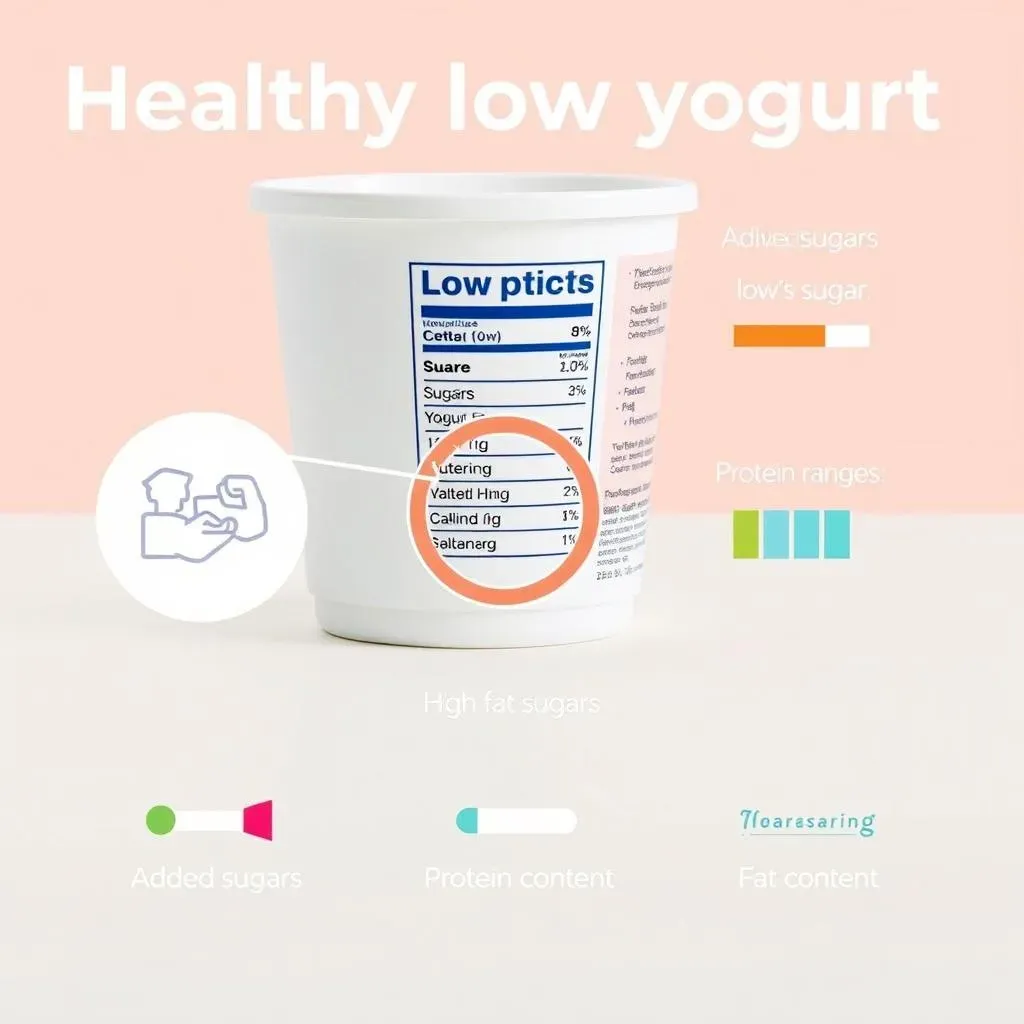
Decoding Yogurt Labels: What to Look for in Healthy Low Fat Yogurt
Added Sugar Awareness
Alright, let's get real about sugar. It's the sneaky culprit that can turn a seemingly healthy yogurt into a dessert bomb. When you're scoping out that nutrition label, the first thing you want to do is zero in on the "Added Sugars" line. This is where yogurt companies often try to pull a fast one, disguising sugar under names like sucrose, fructose, corn syrup, or even honey. Ideally, you want to aim for a yogurt with minimal to no added sugars. The American Heart Association recommends no more than 25 grams of added sugar per day for women and 36 grams for men, so keeping your yogurt in check is a great way to stay within those limits. Remember, the sugar that naturally occurs in milk (lactose) is different from added sugars, so don't sweat the total sugar content too much if the "Added Sugars" is low. Your goal is to find a healthy low fat yogurt that nourishes your body, not just satisfies your sweet tooth.
But how do you really know what's too much? Here's a quick guide:
- Excellent: 0-5 grams of added sugar
- Good: 6-10 grams of added sugar
- Okay: 11-15 grams of added sugar
- Avoid: Over 15 grams of added sugar
Protein Content Matters
Now that we've tackled sugar, let's talk about protein! Protein is your friend when it comes to feeling full and satisfied, and it's also crucial for building and repairing tissues. When you're on the hunt for a healthy low fat yogurt, aim for at least 5 grams of protein per serving. Greek yogurt is a fantastic option because it's naturally higher in protein than regular yogurt, often packing in 15-20 grams per serving. But even if you're not a fan of Greek yogurt, you can still find other low-fat yogurts that offer a good protein boost. Just check the nutrition label and make sure it aligns with your protein goals. Remember, protein helps regulate your appetite and keeps you from reaching for those unhealthy snacks later on.
Here's a table comparing the protein content of different types of yogurt:
Yogurt Type | Protein per Serving (approximate) |
|---|---|
Regular Yogurt | 5-10 grams |
Greek Yogurt | 15-20 grams |
Icelandic Yogurt (Skyr) | 17-22 grams |
Non-Dairy Yogurt (Soy, Almond, Coconut) | Varies, check the label |
Fat Content Consideration
This is where personal preference and health goals come into play. While we're focusing on healthy low fat yogurt, it's important to understand that not all fats are created equal. Some people prefer non-fat yogurt to minimize calorie intake, while others opt for low-fat options that still provide a bit of creaminess. The key is to be mindful of the type of fat and the overall calorie count. Saturated fat should be limited, while unsaturated fats, like those found in nuts and seeds, can be beneficial. Check the nutrition label for the total fat content and the breakdown of saturated, unsaturated, and trans fats. Trans fats should be avoided altogether, as they offer no health benefits and can increase your risk of heart disease. Ultimately, the right fat content for you depends on your individual needs and dietary preferences.
Low Fat Yogurt Types: Finding the Right One for You
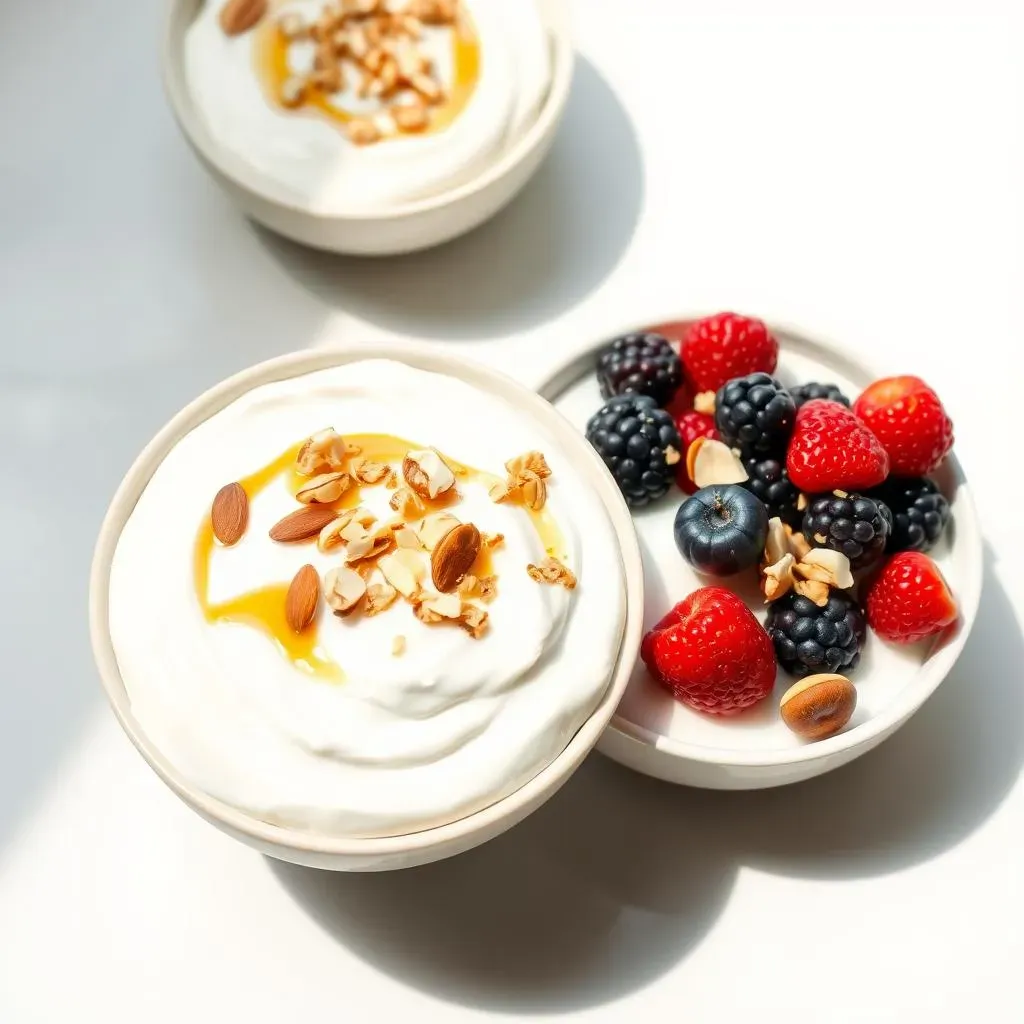
Low Fat Yogurt Types: Finding the Right One for You
Greek Yogurt: The Protein Superstar
Greek yogurt has become a household name, and for good reason. It's strained to remove whey, resulting in a thicker, creamier texture and a significantly higher protein content than regular yogurt. This straining process also reduces the lactose content, making it easier to digest for some people with lactose sensitivities. Beyond its impressive protein stats, Greek yogurt is also a good source of probiotics, calcium, and other essential nutrients. It's a versatile option that can be enjoyed on its own, used in smoothies, or incorporated into savory dishes like dips and sauces. When choosing Greek yogurt, opt for plain, unsweetened varieties to avoid added sugars. You can always add your own healthy sweeteners and toppings to control the flavor and nutritional content.
But with so many brands on the market, how do you pick the best one? Here are a few things to consider:
- Protein Content: Aim for at least 15 grams of protein per serving.
- Added Sugar: Choose yogurts with minimal to no added sugar.
- Fat Content: Opt for low-fat or non-fat varieties.
- Ingredients: Look for simple ingredient lists with no artificial additives.
Icelandic Yogurt (Skyr): The Creamy Cousin
Icelandic yogurt, also known as skyr, is another strained yogurt that's similar to Greek yogurt but with a slightly different texture and flavor profile. Skyr is traditionally made with skim milk and has an even thicker, creamier consistency than Greek yogurt. It's also incredibly high in protein, often boasting even more protein per serving than Greek yogurt. Like Greek yogurt, skyr is a good source of probiotics, calcium, and other essential nutrients. It's a delicious and satisfying option that can be enjoyed in a variety of ways. Whether you're looking for a protein-packed breakfast, a healthy snack, or a creamy addition to your favorite recipes, skyr is a great choice.
Here's a quick comparison of Greek yogurt and skyr:
Feature | Greek Yogurt | Icelandic Yogurt (Skyr) |
|---|---|---|
Texture | Thick and creamy | Very thick and creamy |
Protein Content | 15-20 grams per serving | 17-22 grams per serving |
Taste | Slightly tangy | Mild and slightly sweet |
Lactose Content | Low | Very low |
Boost Your Healthy Low Fat Yogurt: Tasty and Nutritious AddIns
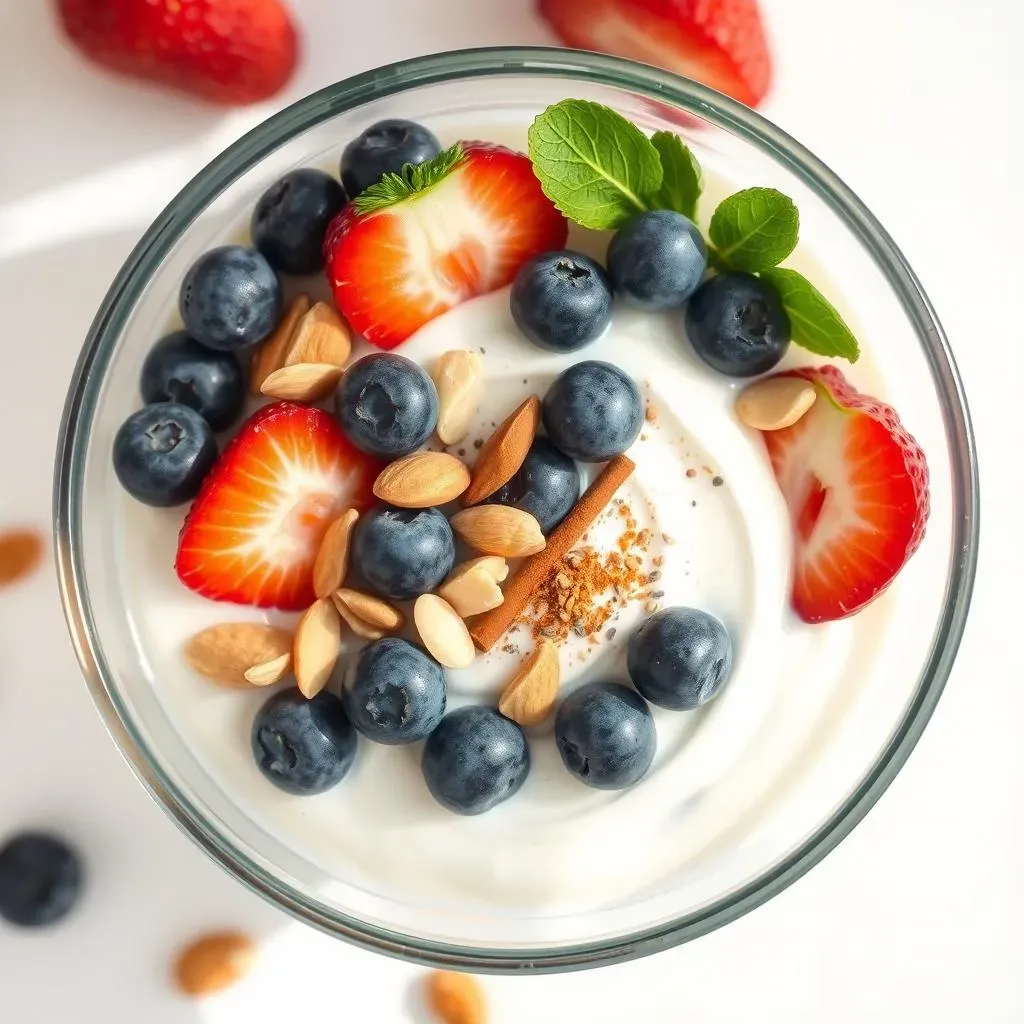
Boost Your Healthy Low Fat Yogurt: Tasty and Nutritious AddIns
Fresh Fruit Fiesta
Plain yogurt can be a blank canvas, and fresh fruit is the perfect way to add natural sweetness, vibrant flavor, and a boost of vitamins and antioxidants. Berries like blueberries, strawberries, and raspberries are packed with antioxidants and fiber, making them a fantastic addition to your healthy low fat yogurt. Sliced bananas provide potassium and a creamy texture, while diced peaches or mangoes offer a tropical twist. The possibilities are endless! Experiment with different combinations to find your favorite fruit pairings. Not only will fresh fruit make your yogurt taste amazing, but it will also contribute to your overall health and well-being.
Here are some winning fruit combinations to get you started:
- Berry Blast: Blueberries, strawberries, and raspberries
- Tropical Tango: Mango, pineapple, and coconut flakes
- Peachy Keen: Sliced peaches, granola, and a drizzle of honey
- Banana Bonanza: Sliced banana, walnuts, and a sprinkle of cinnamon
Nutty and Seedy Crunch
Adding nuts and seeds to your healthy low fat yogurt is a great way to boost the protein, healthy fats, and fiber content. Almonds, walnuts, pecans, and chia seeds are all excellent choices. Nuts provide a satisfying crunch and a dose of healthy fats that can help you feel fuller for longer. Seeds, like chia seeds and flaxseeds, are packed with fiber and omega-3 fatty acids, which are beneficial for heart health and brain function. Just a sprinkle of nuts and seeds can transform your yogurt from a simple snack into a nutritional powerhouse.
Check out this table of nutritional benefits from different nuts and seeds:
Nut/Seed | Key Nutrients | Benefits |
|---|---|---|
Almonds | Vitamin E, magnesium, healthy fats | Supports heart health, improves skin |
Walnuts | Omega-3 fatty acids, antioxidants | Boosts brain function, reduces inflammation |
Chia Seeds | Fiber, omega-3 fatty acids, protein | Aids digestion, supports heart health |
Flaxseeds | Fiber, omega-3 fatty acids, lignans | Promotes regularity, may reduce cancer risk |
Spice It Up
Don't underestimate the power of spices! A dash of cinnamon, nutmeg, or ginger can add warmth and complexity to your healthy low fat yogurt. Cinnamon is known for its blood sugar-regulating properties, while nutmeg and ginger offer anti-inflammatory benefits. Spices not only enhance the flavor of your yogurt but also provide a range of health benefits. Plus, they're a great way to add a touch of sweetness without relying on added sugars. So, experiment with different spices and find your favorite flavor combinations. You might be surprised at how much a little spice can elevate your yogurt experience.
“Adding spices to your yogurt is a simple way to boost its nutritional value and add a burst of flavor. Cinnamon, in particular, is a great choice for its blood sugar-regulating properties.” - Sarah Johnson, Nutritionist
Healthy Low Fat Yogurt: The Anytime Snack
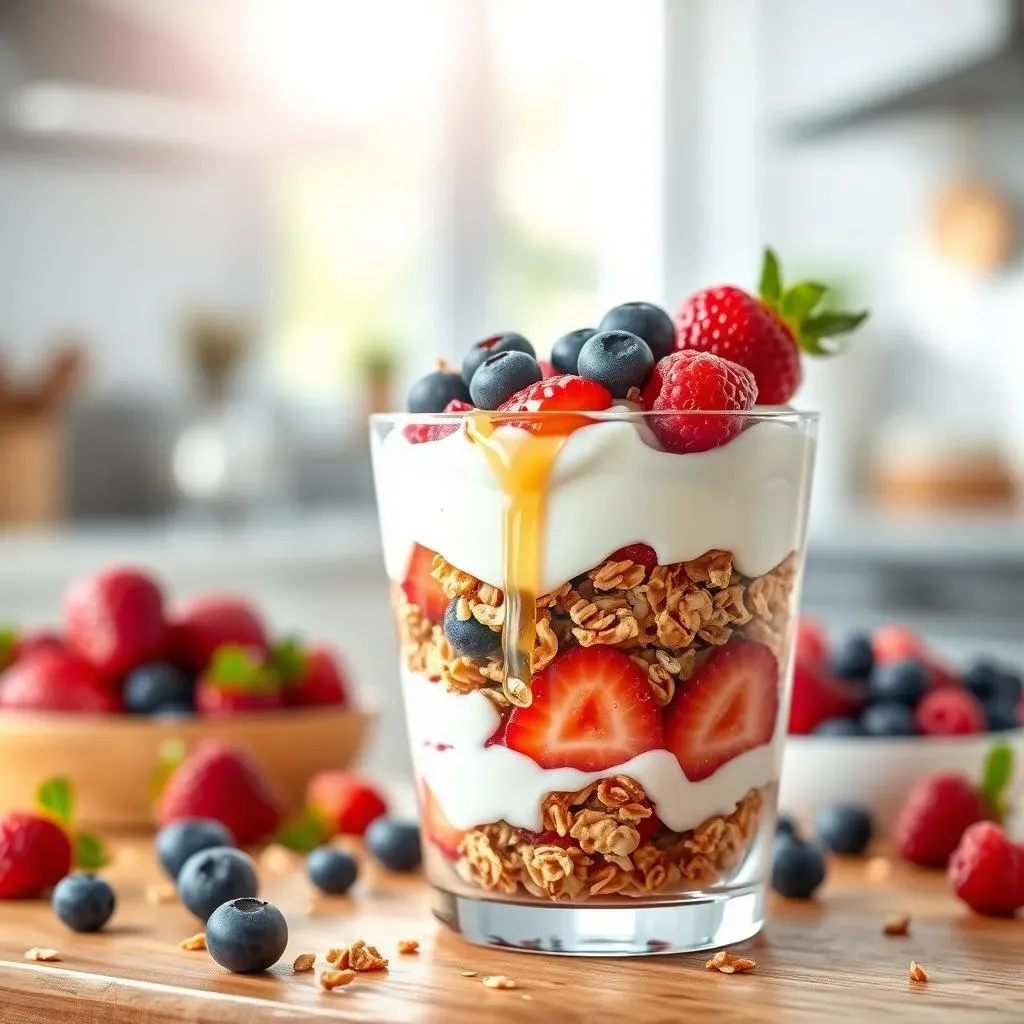
Healthy Low Fat Yogurt: The Anytime Snack
Breakfast Bliss
Starting your day with healthy low fat yogurt is a fantastic way to fuel your body and kickstart your metabolism. It's quick, easy, and packed with protein to keep you feeling satisfied until lunchtime. Top it with fresh fruit, granola, or a drizzle of honey for added flavor and nutrition. A yogurt parfait is a great way to layer different textures and flavors, making breakfast a truly enjoyable experience. Plus, yogurt contains probiotics that support gut health, setting the stage for a happy and healthy day. So, ditch the sugary cereals and processed pastries and embrace the goodness of yogurt for a balanced and energizing breakfast.
Here are some quick and easy yogurt breakfast ideas:
- Yogurt Parfait: Layer yogurt with granola, berries, and a drizzle of honey.
- Fruit and Nut Yogurt Bowl: Top yogurt with sliced bananas, almonds, and chia seeds.
- Overnight Oats with Yogurt: Combine rolled oats, yogurt, milk, and your favorite toppings in a jar and refrigerate overnight.
Afternoon Pick-Me-Up
When that afternoon slump hits, healthy low fat yogurt can be your savior. It's a much better choice than reaching for sugary snacks or caffeine-laden drinks. The protein in yogurt helps stabilize blood sugar levels, preventing those energy crashes that can leave you feeling tired and sluggish. Add some crunchy nuts or seeds for added texture and healthy fats to keep you feeling full and focused. Yogurt is also a great source of calcium, which is important for bone health and nerve function. So, keep a container of yogurt in your fridge at work and reach for it whenever you need a healthy and satisfying pick-me-up.
Here's why yogurt is better than other common afternoon snacks:
Snack | Pros | Cons |
|---|---|---|
Yogurt | High in protein, probiotics, and calcium, low in sugar (if you choose wisely) | Can be boring on its own, requires some planning |
Candy Bar | Quick energy boost | High in sugar, low in nutrients, leads to energy crash |
Chips | Salty and satisfying | High in sodium and unhealthy fats, low in nutrients |
Soda | Provides caffeine | High in sugar, empty calories, can lead to dehydration |
Dessert Delight
Who says dessert can't be healthy? Healthy low fat yogurt can be transformed into a guilt-free treat with a few simple additions. Mix in some fresh fruit, a sprinkle of cinnamon, or a drizzle of honey for a touch of sweetness. You can even create a healthy yogurt bark by spreading yogurt on a baking sheet, topping it with your favorite ingredients, and freezing it until solid. Yogurt is a great source of protein and probiotics, making it a much better choice than traditional desserts that are often loaded with sugar and unhealthy fats. So, indulge your sweet tooth without compromising your health by making yogurt your go-to dessert option.
“Yogurt is a versatile ingredient that can be used in a variety of recipes, from smoothies to desserts. Its creamy texture and tangy flavor make it a great substitute for sour cream or mayonnaise in many dishes.” - Michael Davis, Chef
Your Guide to Healthy Low Fat Yogurt: Final Thoughts
Choosing the right yogurt doesn't have to be a chore. By understanding what to look for on the label and exploring the variety of options available, you can easily incorporate healthy low fat yogurt into your daily routine. Whether you're looking for a protein-packed breakfast, a satisfying snack, or a versatile ingredient for your favorite recipes, yogurt offers a delicious and nutritious way to support your health goals. So, go ahead, experiment with different types and toppings, and discover your perfect yogurt experience!
